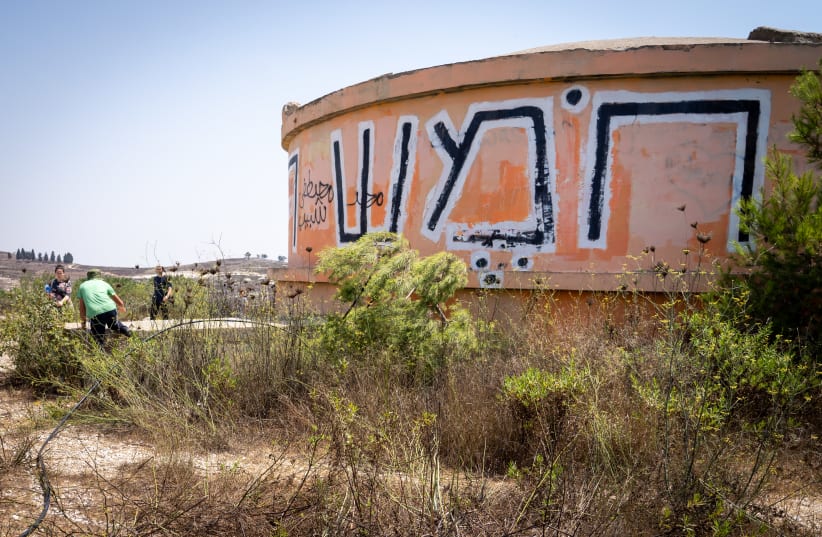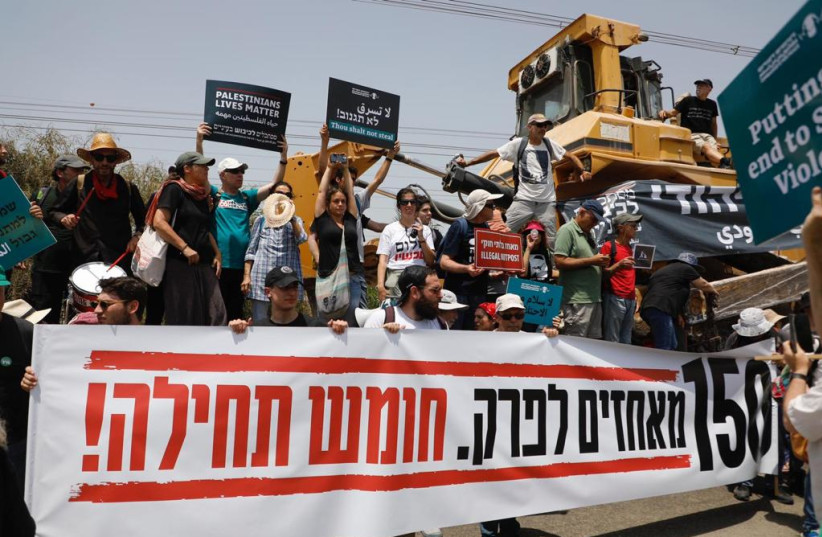The Knesset plenum on Wednesday passed a bill to repeal a part of the Disengagement Law of 2005 in a preliminary vote, marking a step forward in what is one of the far-right parties' flagship legislation.
At issue is the ability to rebuild the four destroyed settlements of Homesh, Sa-Nur, Kadim and Ganim, all of which are in an area so isolated that they are outside the parameters of former US president Donald Trump’s peace deal, which proposed for Israel to apply sovereignty to 30% of the West Bank.
The sites of those former settlements are considered to be in a closed military zone, prohibited to Israeli civilians. The legislation would lift the ban, effectively reversing the part of the 2005 disengagement that dealt with northern Samaria.
Knesset Foreign Affairs and Defense Committee chair MK Yuli Edelstein, who was among a small group of Likud rebels that opposed the 2005 Disengagement, authored the bill with the support of RZP's National Missions Minister MK Orit Struck.
The bill passed the vote with 62 MKs supporting the bill and 36 voting against it. It will now move to one of the Knesset's committees in preparation for its first reading on the Knesset floor.
"Today we are fixing the injustice. We are continuing to deliver what we promised in the election – cancelling the Disengagement Law! After 18 years we are doing justice and fixing the great injustice that was done to the settler movement and the entire state of Israel. Now the mission is to establish and develop Homesh and the settler enterprise in northern Samaria and continue strengthening our grip on the Land of Israel."
Religious Zionist Party
The Religious Zionist Party said in a statement, "Today we are fixing the injustice. We are continuing to deliver what we promised in the election – cancelling the Disengagement Law! After 18 years we are doing justice and fixing the great injustice that was done to the settler movement and the entire state of Israel. Now the mission is to establish and develop Homesh and the settler enterprise in northern Samaria and continue strengthening our grip on the Land of Israel."
Labor MK Gilad Kariv criticized the law.
"This bill, if it passes into law, will lead to the establishment of illegal outposts in northern Samaria and will increase the friction between Israelis and Palestinians. The proposal is another step towards the de-facto annexation that the government is promoting, and to the reality of a bleeding bi-national state."
Gilad Kariv
"This bill, if it passes into law, will lead to the establishment of illegal outposts in northern Samaria and will increase the friction between Israelis and Palestinians. The proposal is another step towards the de-facto annexation that the government is promoting, and to the reality of a bleeding bi-national state.
"It is concerning and saddening that the FADC chair is not taking into account the unnecessary burden for the security forces, which will detract from the IDF's ability to face the real strategic threats to the State of Israel," Kariv wrote.
Edelstein, Struck, and a number of other MKs and civil leaders hailed the law's passing with a toast in Edelstein office in the Knesset.
Right-wing politicians have pushed over the years to advance such legislation, including six failed attempts at the Legislative Committee, where prime ministerial approval is needed for the passage of a bill.
The big issue for Israel's Right: Homesh
At issue in particular for the Israeli Right is the site of the former Homesh settlement, which, unlike the other three destroyed northern Samaria communities, had been built on private Palestinian land seized by the military before the High Court of Justice prohibited such action.
The High Court returned the property to its Palestinian owners in 2013 and has allowed them to farm the land. Access has been an issue due to the continual presence on the site of a small contingent of the former Homesh Yeshiva, which had once existed at the former settlement.
In 2019, Israeli NGO Yesh Din petitioned the High Court, asking that it force the state to permanently ban the yeshiva from the hilltop, arguing that its presence has led to violent altercations and made it impossible for the Palestinian landowners from the village of Burka to farm their land there.
Yesh Din said the issue here was not repealing the Disengagement, “but stealing the land” from the residents of Burka.
“Since they failed to legally justify the settlers’ land theft, the government decided to repeal the law enacted by the Knesset and violated for years in order to retroactively legalize the theft,” Yesh Din said on Sunday after the bill was approved by the cabinet.
“Canceling the Disengagement Law, however, will not change the status of the private lands and it will not be possible to legalize the outpost [the yeshiva].
“In addition, this is a blatant violation of international law and another step in the annexation process led by the Israeli government,” Yesh Din added.

